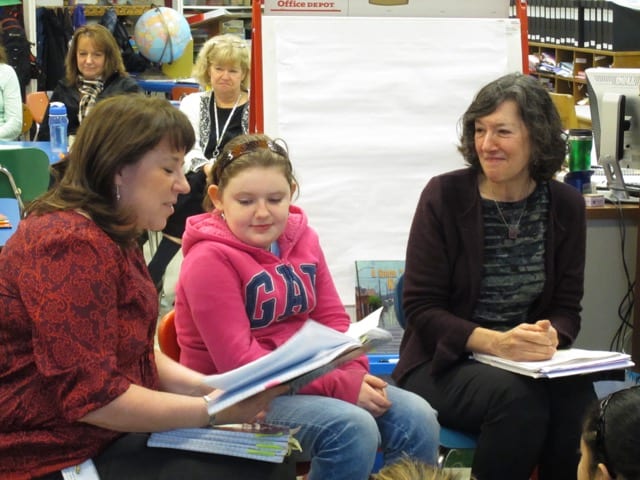Last week we published an Around the Web article, Is the U.S. All Wrong? Teacher Training Breaking the Mold, that garnered a lot of conversation. Education thought leader Regie Routman provides her perspective discussing the role Professional Development/Learning play in educating teachers.
Reaction
By Regie Routman | Feb. 2016
As a teacher, coach, and leader working in diverse schools and classrooms for the past 45 years, I’d like to weigh in on the current discussion around teacher preparation in the U.S., especially as related to recent research and news noting that several other countries do a far better job “training” their teachers than we do in the U.S.
First and foremost, I believe we do, in fact, “train” teachers but we don’t highly educate them. That is, we train teachers to follow procedures, manuals, and new initiatives lock-step instead of solidly educating them so they think at high levels and can use mandates and resources as frameworks and guides. We train them how to implement programs “with fidelity” instead of showing them how to use any program “with flexibility”, based on learners’ strengths, needs and interests. We train teachers to implement standards but don’t sufficiently show them how and why and do so in a coherent and meaningful manner. We train them how to do test prep, give tests, and look at data without educating them on how and why formative assessment must be part of daily responsive teaching.
Professional development in the U.S.– even when it does occur–is often random, top down, and focused on “training” and not on educating for thinking, analyzing, reviewing, reflecting, inquiring, collaborating, and questioning. It should be no surprise that recent research on PD, where the PD and follow up coaching were heavily based on phonics, phonemic awareness, reading words in isolation, and fluency did not yield growth in reading comprehension. As well, it should be no surprise that random acts of professional development yield superficial and fleeting learning, at best.
In countries where students excel, teachers develop what John Hattie calls “collaborative expertise.” They have ongoing, school embedded, high level opportunities for collaborative study, professional reading and discussion, mentorship and coaching, viewing and analyzing expert literacy practices, applying such practices to the classroom, and receiving actionable feedback. That professional learning is grounded in prioritizing and focusing on what’s most important for students’ learning, for example improving the teaching of writing, and keeping that the main focus for several years. Teachers and administrators learn together in a culture of high trust, inquiry, and shared beliefs, all of which are connected to research-based practices. Very important, all members of the school community share a collective responsibility—a commitment to “our students”, not just “my students.”
All of what has just been discussed is difficult but doable. It takes a long term commitment to improving and sustaining student learning, the will to do better for all students, ongoing professional study that leads to application of expert instructional literacy practices, and seeing ourselves as models for our students. That is, we become highly educated, questioning and thinking teachers, not trainees in an assembly line who need a manual to lead us every step of the way. A manual can be successfully used as a guide but only when we have a rock solid, knowledgeable foundation of literacy and learning and can effectively apply any content to align with our carefully thought out, research-based beliefs and practices. Training can be done fairly quickly; education takes time, but done well it’s engaging, energizing, and joyful.
Reflect
Use the following questions and statements to assess where you and your school and district are in the PD process and to move PD forward in a thoughtful manner.
-
Does your school and district embrace meaningful, ongoing professional learning to improve and sustain “best” practices? That is, is the end goal increasing student learning? If not, why not, and what can you do to make your voice heard and improve the PD?
-
If you are strictly following a commercial or scripted program one year after its implementation, that means in-depth professional learning is probably not occurring. How might you change that?
-
Are you ensuring that you read professionally to keep up with current research and practices that lead to increased student learning?
-
Are you sharing, discussing, and collaborating with colleagues at and across your grade level and content area? If not, why not?
-
Do you have a Leadership Team at your school, headed by the principal, to plan and carry out the professional learning? If not, consider using my book Read, Write, Lead: Breakthrough Strategies for Schoolwide Literacy Success (ASCD, 2014) for procedures and guidelines.
-
Perhaps, most critical, do you have a school culture of trust and respect that makes collaborative professional learning, coaching, co-teaching, and risk taking possible and likely? If not, what part might you play in making the culture more positive and respectful for all?
REGIE ROUTMAN has more than four decades of experience as a classroom teacher, mentor teacher, literacy coach, and leader working in diverse classrooms and schools across the U.S. and Canada. Currently, her work involves mentoring leaders and teachers in diverse, underperforming schools and districts where she collaborates to improve reading and writing achievement. Her many research-based books and resources demonstrate and support teachers and principals in how to create and sustain effective, efficient, and joyful school cultures where all learners thrive. Her latest book is Read, Write, Lead: Breakthrough Strategies for Schoolwide Literacy Success (ASCD, 2014.) For full information on Regie’s publications, PD offerings, and blog, see www.regieroutman.org
